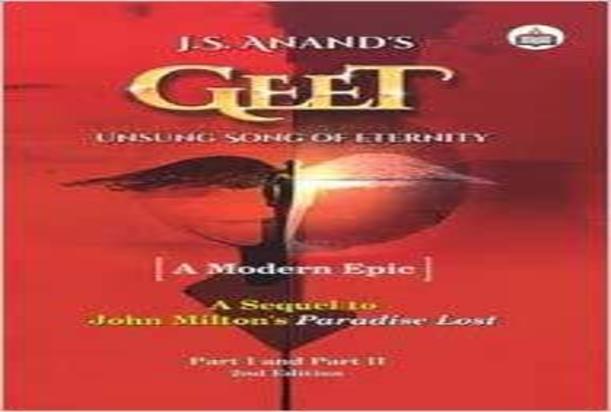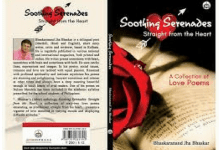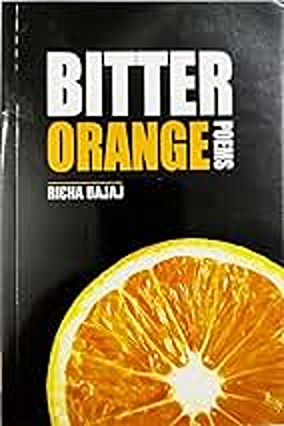The poet here tries to
The introducing poem of Anand’s lyrical epic, entitled “Prayer Sing Heavenly Muse”, (Canto 1) is an invocation to the Muse. But the way, Anand makes the invocation to Muse is different from the invocation we find in classical epics. The poem begins:
Sing heavenly muse of the lost balance of the universe
As a result of the original sin
And the disobedience of the great sire . . .
This is not Anand’s prayer to the Muse to empower him to write a great poem on a lofty and serious theme. The poet here tries to analyse the reasons of the decay and degeneration of a modern man. He goes on describing how prophets have come and gone and no perceptible light is seen. Towards the end of the poem the poet laments for the sign of no restoration of ‘order and harmony’. Canto 1 itself is an emblem of Anand’s profound prayer to the Divine to help him continue his writing for the light that will befall upon the life of a modern man. And this prayer is spread over the whole of the collection of his lyrical epic poems (Canto 1). The next poem “In Praise of the Rhymer” is a light of hope and that is the ‘transformative power that is charged by dream. It is the creative artist’s power that will silence the ‘deadly music of life’. Here Anand underscores the importance of poetry. To him poetry is the finest truth of all. Poetry is more important than Science and all Philosophies. Anand has changed the nature of the invocation to Muse considering the modern context. The artist is the muse here and the poet prays to that artist muse. The key idea is that art in its any form can remove all miseries and sufferings of a modern man and the society.
Milton is known for his misogyny. Eve is a weaker sex, very susceptible to be persuaded by Satan. So Eve is Satan’s first choice. Anand being aware of modern woman’s empowerment does not undermine the strength of womanhood. In the third stanza of the poem no.1
(Canto I), he asks:
What was the emergency
To turn into a seed
And sprout in a womb?
Was it the joy of the pangs?
Of a woman’s motherhood?
The answer is found in the next poem (3) that begins with “He is your Paaapa … A plan against God’s plan”. Here the poet reminds us of the contrast between Adam and Eve and modern Man and Woman. The ancient Man and women fell from heaven and their modern counterparts are in the abysmal depth of sin –the sin in the modern context. The subsequent poems of this Canto 1 continue delineating modern man’s sufferings and self-destruction with certain exceptions of hope and light in poems number 15 to 21. In these poems, some rays of hope of regeneration are discernable. At the concluding section of the poem the hope of rebirth symbolises the continuity of life through love. The poet says:
Let your transparent soul
Glow with love
And your thoughts
The next unwritten text read
Modern man is in need of love of plurality and ‘different truths’, otherwise the doom is inevitable.
Canto 11 of Geet entitled “Glimpses of Chaos” introduces Man in the Greek tragedy who involves himself, though unknowingly, in an incestuous relationship with his mother. Following the Greek mythology after he kills his father, the Aristotelian Prime Mover leads him towards destruction and the subjects of the Kingdom meet the ultimate doom. The Man in the past is King Oedipus. This sin of the king may be the first one committed by the son of Adam after his fall into earth. In the next poem No.11) Adam is nonplussed as to what type of sin he has committed. The poet says:
Adam still wonders
What was wrong?
In eating the fruit
Even it was forbidden?
One interesting point of this narrative in these two Cantos is the natural continuity of one single episode. The modern Man is the offspring of Adam, the resident of the Garden of Eden who has been castigated from the Heaven to the Earth. And in this continuum the lyrical epic narrative is conspicuously present.
The lyrical exuberance of Anand’s Geet continues from the first two Cantos to the third Canto, entitled: “The Contract: Thou Shalt Not Love” with no jerk at all. The poem in this Canto is replete with lyrical drama .It is a conversation between Dr Faustus and Satan. In Marlowe’s Dr Faustus the protagonist made a contract with Mephistopheles, an embodiment of the evil. Faustus mortgaged himself to the Evil for a period of 24 years to acquire the Infinite Knowledge. To try to acquire infinite knowledge is one of the seven deadly Sins. The Canto 111 introduces Satan and Faustus who welcome Satan to the ‘Empire of the prince of Darkness’. In response to his appearance in the world of sin, Satan is enthusiastic and says:
It pleases me
Faustus,
That once again you get a choice
And your choice falls on this land.
This comradeship between Satan and Faustus is the marriage of the two Evils. It is a marriage of convenience. Both of them make the blueprint of how they will degenerate a modern man. Satan says:
Yes Faustus,
I want each man fitted in with a device
Called LUST.
Lust is the sweetest daughter.
Here the daughter symbolises a Modern woman. Perhaps Anand’s misogyny has been revealed through these lines because the poet thinks that woman is the courier of Lust. Lust for anything is present both in man and woman. But the modern Anand and Milton are different. Anand here writes this lyrical epic in the modern concept. To him perhaps the shadow of Milton’s obsession of misogynic idea is inescapable. The poet says, “She has the power to tempt all, big and small. This lust ignites Desire which is the basic force in man and “every man is after one thing or another”. The historic Helen of Troy is omnipresent in every woman in all times in general and in modern times in particular. And thus modern man accumulates Dirt and Filth. Satan then advises Faustus to keep his skin thick. Anand uses ‘skin’ as a metaphor of sexuality. Finally appears the Archangel and the angel concludes that the discourse between the two Evils is a “political conference” that makes a resolution on how to wreck the peace of man and woman in modern times.
The concluding stanza of this Canto underscores Anand’s ultimate belief in Mankind. “And the Middle East is burning. /Trump will ensure/The Earth loses all claims to Peace and Tranquility”. But he has not lost his hope and the harmony of the world. The lyrical outburst takes place in the last stanza of this Canto when he foresees:
. . . Let us be sure of another 1000 years
When some other mighty incarnation
Of the Great Milton
Would host a meet so grand.
The ending of Canto 111 is the ultimate triumph of man’s former glory and bliss.
The reincarnation of God is seen in the last section of this Canto.
(To be continued)
©Basudeb Chakraborti
Photos from the Internet
#Books #Review #DifferentTruths





 By
By
 By
By
 By
By
 By
By